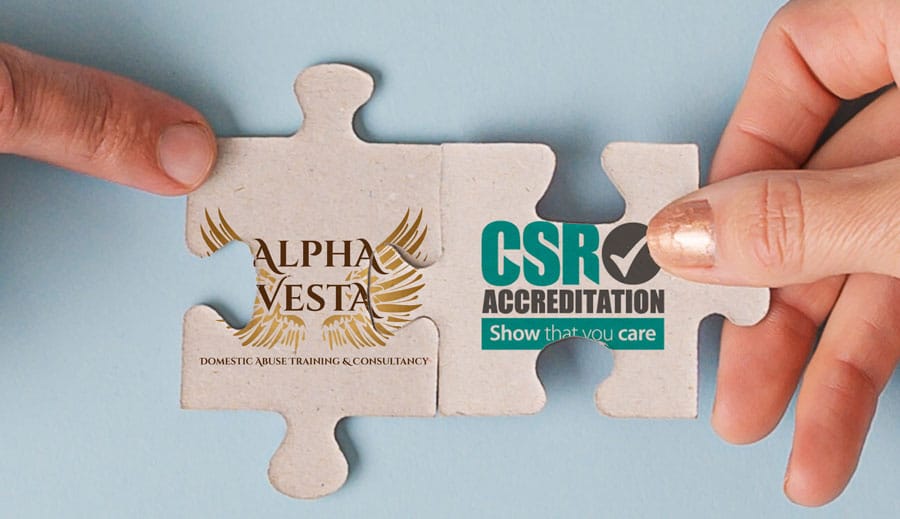Domestic Abuse and Corporate Social Responsibility
When values, culture and actions combine, people are better able to connect with your organisation as well as each other
Alpha Vesta are committed to ‘breaking the cycle of domestic abuse through the workplace’ by supporting employers to build a strong culture of understanding throughout their workforce. This not only benefits the workforce itself but ripples out into the community through everyone that comes into contact with that organisation as well as the communities that employees return home to each day. Alpha Vesta deliver on their mission by running awareness and training sessions, presentations and talks as well as supporting employers in developing robust policies and procedures in order to recognise the signs and respond effectively and safely to those who have or are experiencing domestic abuse.
Alpha Vesta are delighted to partner with CSR-A Ltd, a leading UK company delivering a global standard for social responsibility. CSR-A promote and support organisations to be more socially responsible. This can be from reducing negative impacts on the planet to taking a truly holistic approach to caring for its people and everything in between.
The United Nations has 17 Sustainable Development Goals (SDGs) to unite everyone behind common goals and to make a real difference collectively. UNSDG No. 17 is ‘developing partnerships’ in order to reach our goals. The CSR-A Ltd and Alpha Vesta CIC partnership supports both people and businesses.
The most recent data from the Office of National Statistics in November 2020, highlighted that one in 5 adults will be affected by domestic abuse at some during their adult lifetime and the NSPCC estimate that 1 in 5 children are or have experienced domestic abuse in the home. Sadly, domestic abuse doesn’t always look like we think it will as there are many prevailing narratives and stereotypes that sit around it which hinder someone recognising the signs.
The impact of domestic abuse within the workplace is phenomenal with one report in 2019 (Vodafone and KPMG) quoting £316 million per year being lost in terms of just the absences relating to domestic abuse. The national social and economic costs of domestic abuse are estimated to be £66 billion (Home Office, 2019) with roughly £14 billion of that as a direct cost to the economy.
One study commissioned by Vodafone in 2019 and conducted by Opinium highlighted that around 40% of victims of domestic abuse will be in employment at some point, which means that the majority of workplaces will be impacted but are unlikely to know how or what to do about it. Domestic Abuse impacts on mental health, wellbeing, absence, lateness, productivity as well as also impacting on an affected employee’s colleagues and team. Research shows that colleagues often try to ‘protect’ or ‘cover for’ the affected employee, which impacts on them in complex ways in terms of their own mental health and wellbeing.
The boundaries between work and home have become even more blurred since the pandemic. People are a business’s most valuable asset and it is important to take a holistic view of the people that work for us. The work that Alpha Vesta do in raising awareness of domestic abuse is part of the increasing work that businesses and organisations are doing around inclusion and mental health and wellbeing.
CSR-A Ltd run an accreditation process that demonstrates how socially responsible an organisation is. The assessment covers the 4 pillars of: Environment, Workplace, Community and Philanthropy.
The partnership between Alpha Vesta CIC and CSR-A Ltd blends seamlessly into the Workplace, Community and Philanthropy pillars because looking after all your employees is not only the right thing to do, it is also good for business. A happier workforce is a more productive workforce. Retaining talent helps reduce recruitment and re-training costs as well as keeps growing company knowledge and culture within staff.

